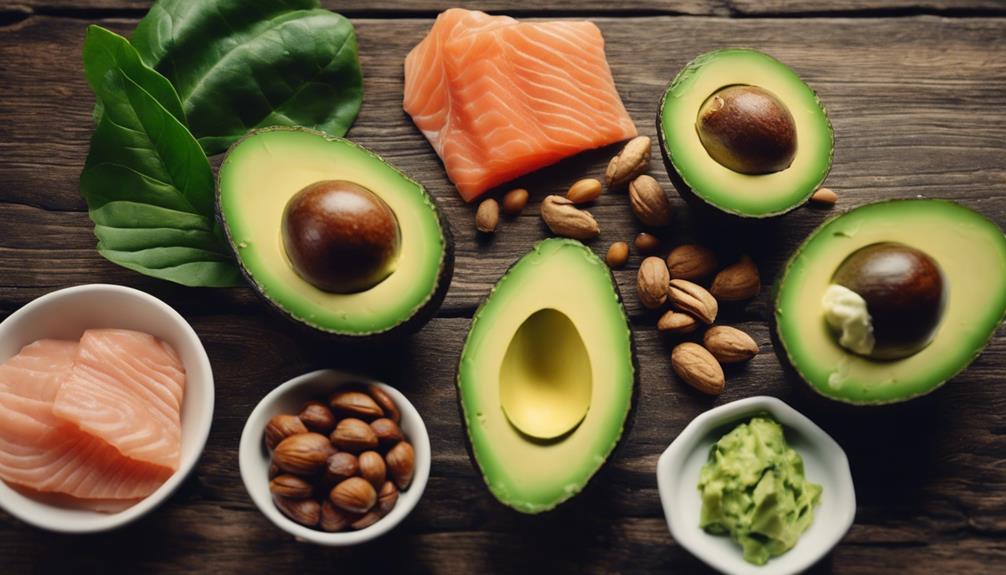
Imagine the keto diet as a key that unlocks a realm of potential benefits for your health and well-being. As you contemplate embarking on this dietary journey, it's essential to weigh the advantages and drawbacks that come with it.
From shedding excess pounds to experiencing a surge in energy levels and mental clarity, the keto diet offers promising outcomes. However, navigating through the challenges and ensuring a sustainable approach might require careful consideration and expert guidance.
Stay tuned to discover how you can optimize the benefits and address the hurdles of embracing the keto lifestyle.
Key Takeaways
- Keto diet offers benefits like improved blood sugar control and mental clarity.
- Overcoming challenges involves meal planning and communication.
- Sustainable approach includes balance, lifestyle changes, and healthy habits.
- Seek professional guidance for personalized advice and health monitoring.
What Is the Keto Diet?
If you're curious about the keto diet, it's a way of eating that focuses on high fat, moderate protein, and very low carbohydrate intake. By significantly reducing your carb intake, typically to about 20-50 grams per day, your body enters a metabolic state called ketosis. In ketosis, your body becomes incredibly efficient at burning fat for energy instead of carbohydrates. This shift in fuel utilization not only aids in weight loss but also offers various health benefits.
Carb restriction is at the core of the keto diet. When you limit carbs, your body depletes its glycogen stores and switches to burning fat for fuel. This process leads to the production of molecules called ketones, which become your body's new energy source. The benefits of ketosis include improved weight loss, better blood sugar control, increased mental clarity, and enhanced energy levels. Embracing the keto diet and reaching ketosis can bring about a sense of empowerment as you take charge of your health and well-being.
Benefits of the Keto Diet
By following the keto diet and achieving ketosis, you can experience a range of benefits that go beyond just weight loss. The keto diet has been associated with various medical benefits. Studies suggest that it may help improve conditions like type 2 diabetes by lowering blood sugar levels and reducing insulin resistance. Additionally, the keto diet has shown promise in reducing inflammation, which is linked to various chronic diseases.
Moreover, the keto diet has been praised for its performance-enhancing effects. Athletes and active individuals often report increased endurance and improved energy levels once they adapt to burning fat for fuel instead of carbohydrates. This shift in energy source can lead to more stable energy levels throughout the day, potentially enhancing athletic performance and overall productivity.
Incorporating the keto diet into your lifestyle may not only aid in achieving weight loss but also offer significant medical benefits and performance enhancements. It's essential to consult with a healthcare professional before making any significant dietary changes to ensure it aligns with your individual health goals and needs.
Weight Loss on Keto
When following the keto diet, weight loss can be achieved through a metabolic state known as ketosis. This state prompts your body to burn fat for fuel instead of carbohydrates, leading to effective weight loss.
Here are some key points to consider as you embark on your keto weight loss journey:
- Plateau busting: Keto can help break through weight loss plateaus by shifting your body's energy source to fat, encouraging continuous fat burning.
- Carb cravings: Initially, you may experience cravings for carbs as your body adjusts to using fats for energy. Stay strong through this phase; it will pass, and you'll regain control over your cravings.
Increased Energy Levels
To sustain increased energy levels on the keto diet, prioritize nutrient-dense foods and maintain proper hydration throughout your day. Meal prepping can be a game-changer, ensuring you have keto-friendly options readily available. Include sources of healthy fats like avocados, nuts, and olive oil, along with protein sources such as fish, eggs, and lean meats. Incorporate low-carb vegetables like spinach, broccoli, and zucchini to round out your meals.
When it comes to enhancing your energy levels further, incorporating an exercise routine can amplify the benefits of the keto diet. Engaging in physical activity not only supports weight management but also boosts your overall energy levels. Try to find activities you enjoy, whether it's yoga, weight lifting, or a brisk walk outdoors. Consistency is key, so aim for a mix of cardio and strength training to maximize your energy potential.
| Nutrient-Dense Foods | Hydration | Exercise Routine |
|---|---|---|
| Avocados | Drink plenty of water | Mix cardio with strength training |
| Nuts | Herbal teas | Enjoy activities you love |
| Lean meats | Infused water | Stay consistent |
Mental Clarity and Focus
For improved mental clarity and focus on the keto diet, prioritize consuming foods rich in omega-3 fatty acids such as salmon, chia seeds, and walnuts. Omega-3 fatty acids play a vital role in cognitive enhancement, boosting productivity, and promoting mental acuity and brain health. These healthy fats are known to support brain function and have been linked to improved focus and concentration.
In addition to omega-3 sources, incorporating nutrient-dense foods like avocados, eggs, and leafy greens into your meals can further enhance your mental clarity and productivity on the keto diet.
Foods to Boost Mental Clarity:
- Wild-caught salmon: Packed with omega-3s for brain health
- Chia seeds: Rich in antioxidants and fiber to support cognitive function
- Walnuts: Provide a plant-based source of omega-3 fatty acids
- Avocados: Contain healthy fats for improved focus and concentration
Improved Blood Sugar Control
Enhancing blood sugar control is a key benefit of following the keto diet, as it focuses on minimizing carbohydrate intake to stabilize glucose levels and improve insulin sensitivity. By reducing the consumption of carbs, your body shifts into a state of ketosis, where it burns fat for fuel instead of relying on glucose. This process can lead to more stable blood sugar levels throughout the day, reducing spikes and crashes that often accompany high-carb meals.
Here is a table summarizing the impact of the keto diet on blood sugar and insulin sensitivity:
| Effects | Keto Diet |
|---|---|
| Blood Sugar Levels | Stabilizes and reduces fluctuations |
| Insulin Sensitivity | Improves by decreasing reliance on glucose |
| Metabolic Health | Enhances overall health by promoting fat metabolism |
| Type 2 Diabetes | May help manage and even reverse symptoms |
| Energy Levels | More consistent energy due to stable blood sugar |
Following a keto diet with proper guidance and monitoring can potentially offer significant benefits for managing blood sugar levels and improving insulin sensitivity.
Potential Risks and Pitfalls
Minimizing carbohydrate intake on the keto diet can bring about certain potential risks and pitfalls that individuals should be aware of. While the keto diet has shown promising benefits, it's crucial to consider the following risks and take necessary precautions:
- Nutrient Deficiencies: Cutting out major food groups like fruits, whole grains, and certain vegetables can lead to deficiencies in essential vitamins and minerals.
- Digestive Issues: Rapidly increasing fat intake and reducing fiber from carbohydrates may cause digestive discomfort such as constipation or diarrhea.
- Ketoacidosis: Individuals with diabetes or pancreatitis should be cautious, as the keto diet can potentially lead to a dangerous condition called ketoacidosis.
- Cholesterol Levels: Some people may experience an increase in LDL cholesterol levels due to the higher intake of saturated fats, which could impact heart health.
To mitigate these risks, consult with a healthcare provider before starting the keto diet, monitor nutrient intake, stay hydrated, and consider incorporating a variety of healthy fats and nutrient-dense foods into your meals.
Keto Flu: What to Expect
Experiencing symptoms of the keto flu is a common occurrence for many individuals transitioning to a ketogenic diet. As your body adjusts to using fat for fuel instead of carbohydrates, you may feel fatigued, irritable, and experience headaches. This phase, known as keto adaptation, can last anywhere from a few days to a couple of weeks.
To help alleviate these symptoms, it's crucial to focus on maintaining proper hydration levels. Drinking plenty of water and electrolyte-rich fluids can support your body through this transition period. Electrolytes such as sodium, potassium, and magnesium play a vital role in keeping your body balanced and can help prevent dehydration, which is common during the keto flu.
Overcoming Challenges on Keto
If you find yourself facing hurdles while following the keto diet, there are effective strategies to help you overcome these challenges and stay on track towards your health goals. One key aspect to successfully navigate the keto journey is meal planning. By preparing your meals in advance, you can ensure you have the right foods available and avoid succumbing to temptations that might derail your progress.
Another common challenge on the keto diet is managing social occasions. Here are some tips to help you stay on track:
- Communicate: Inform your friends and family about your dietary choices so they can support you.
- Bring a Dish: Prepare a keto-friendly dish to share at gatherings, ensuring you have something to eat.
- Focus on Protein and Veggies: Prioritize protein and vegetable options when dining out to stay within your keto goals.
- Plan Ahead: Check restaurant menus in advance to select keto-friendly options and avoid impulsive choices.
Sustainable Long-Term Approach
For a sustainable long-term approach to the keto diet, focus on incorporating a variety of nutrient-dense foods to ensure balanced nutrition and continued success. Nutrition balance is key to maintaining your health while following the keto lifestyle. Make sure to include a range of vegetables, healthy fats, and protein sources to meet your body's needs.
Lifestyle changes play a crucial role in the sustainability of the keto diet. When adopting this way of eating for the long term, it's essential to find a balance that works for you. This may involve meal prepping, planning ahead, and making mindful choices when dining out.
To make the keto diet a sustainable part of your lifestyle, focus on building healthy habits that support your overall well-being. Remember, consistency is key when it comes to long-term success. By prioritizing nutrition balance and making gradual lifestyle changes, you can enjoy the benefits of the keto diet while maintaining a sustainable approach that works for you.
Keto-Friendly Foods
Curious about which foods are keto-friendly and can support your dietary goals? When following a keto diet, it's essential to focus on low-carb, high-fat options. Here are some keto-friendly foods that can help you stay on track with your journey:
- Avocado: Packed with healthy fats and fiber, avocados make a perfect keto snack or addition to your meals.
- Salmon: A great source of omega-3 fatty acids and protein, salmon is a versatile option for your keto meal plans.
- Nuts and Seeds: Almonds, chia seeds, and pumpkin seeds are nutrient-dense snacks that can keep you satisfied while following a ketogenic diet.
- Leafy Greens: Spinach, kale, and arugula are low in carbs and high in vitamins, making them excellent choices to include in your keto meals.
Seeking Professional Guidance
When considering embarking on the keto diet, seeking guidance from a healthcare professional or a registered dietitian can provide valuable support and ensure you are on the right track for meeting your nutritional needs. Expert advice is crucial as the keto diet involves significant changes in macronutrient intake. A professional can help you understand the potential risks and benefits, guide you on proper food choices, and monitor your health markers throughout the diet.
| Benefits of Seeking Professional Guidance | Reasons |
|---|---|
| Personalized advice | Tailored recommendations based on your health status and goals. |
| Nutritional balance | Ensuring you meet all essential nutrient requirements. |
| Health monitoring | Regular check-ins to assess progress and adjust the plan. |
| Troubleshooting support | Addressing challenges and adapting the diet to your needs. |
Professional support is not about restricting your choices but empowering you to make informed decisions. By working with an expert, you can navigate the keto diet safely and effectively, maximizing its benefits while minimizing potential drawbacks.
Frequently Asked Questions
Can I Follow the Keto Diet if I Have a History of Eating Disorders?
You should be cautious when considering the keto diet with a history of eating disorders. Prioritize your mental health and consult a healthcare professional for guidance. Balance is key for overall well-being.
How Does the Keto Diet Affect Hormone Levels in Women?
When you follow the keto diet, your body's metabolism shifts, impacting hormone levels in women. This change can help regulate insulin and other hormones, supporting hormonal balance. It's essential to monitor your body's response to ensure overall well-being.
Is It Safe to Follow the Keto Diet While Pregnant or Breastfeeding?
During pregnancy or breastfeeding, it's essential to meet your nutrient requirements for both you and your baby's health. The keto diet may not provide all necessary nutrients for optimal fetal development, so consult healthcare professionals for guidance.
Can I Still Build Muscle on the Keto Diet?
You can definitely build muscle on the keto diet. By staying in ketosis and ensuring adequate protein intake, you support muscle growth. Focus on quality protein sources and adjust your diet to meet your fitness goals.
Are There Any Potential Interactions Between Medications and the Keto Diet That I Should Be Aware Of?
When considering dietary supplements while on the keto diet, it's vital to be cautious about potential interactions with medications. Monitor your blood sugar levels regularly and consult with a healthcare provider to ensure optimal health.
Conclusion
In conclusion, the keto diet offers numerous benefits including weight loss, increased energy levels, and mental clarity.
However, it also comes with challenges that can be overcome with a sustainable long-term approach and guidance from professionals.
Remember, Rome wasn't built in a day, so be patient and keep pushing forward on your keto journey.
The road may be bumpy, but the destination is worth the ride.









Comments are closed.